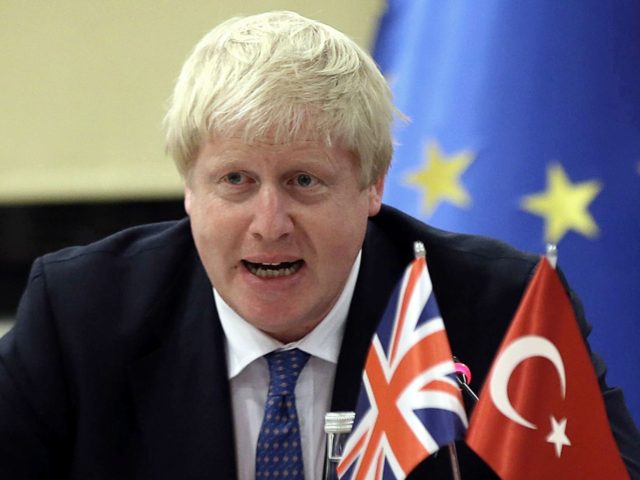KALFAT, Turkey (AP) — A village in central Turkey where Boris Johnson traces his Turkish ancestry to is abuzz with excitement and pride over the news that a man they see as one of their own has become the new prime minister of Britain.
Residents of the mainly farming village of Kalfat, in Cankiri province, 100 kilometers (62 miles) north of the Turkish capital Ankara, gathered at its main assembly place on Tuesday to celebrate after Johnson won a Conservative Party leadership contest triggered by the resignation of Theresa May, according to town administrator, Bayram Tavukcu. Johnson took office as British prime minister on Wednesday.
Residents here dismiss as “political rhetoric” past comments by Johnson that were sometimes deemed to be anti-Muslim or anti-Turkish and said they hope that he will visit Kalfat while in office.
“We were honored that someone who has Ottoman genes, who comes from these lands, has become the prime minister of a prodigious country,” said Adem Karaagac, the former administrator of the village of 1,300.
Johnson’s paternal great-great-grandfather, Haci Ahmet Riza Efendi, was born there in 1813 and the house he lived in is still standing. The family members were known as the “Sarioglangiller” which roughly translate as “of the family of the blond boy,” Karaagac said, though it was not known if Johnson inherited his blond hair from his Turkish ancestry.
Johnson is usually associated with the British upper middle class because of his family’s wealth and his education at the exclusive schools Eton and Oxford. But he has been known to bring up his Turkish roots whenever challenged about his ability to understand modern Britain’s multiethnic, multicultural nature. During a Conservative Party leadership debate in June, he defended himself against accusations of Islamophobia.
“When my Muslim great-grandfather came to this country in fear of his life in 1912, he did so because he knew it was a place that was a beacon of generosity and openness and a willingness to welcome people from around the world,” Johnson said. “I think my Muslim great-grandfather would have been astonished to have found that his great-grandson had become foreign secretary. But he would have been very proud and I think it would be a tribute to this country.”
Johnson explored his Turkish roots in a 2008 episode of the BBC genealogy program “Who Do You Think You Are?” When he visited Turkey as foreign minister in 2016, Johnson told journalists that his family was from Kalfat.
At least six families currently residing at the village are distantly related to Haci Ahmet Riza Efendi, Karaagac said.
Satilmis Karatekin, a distant cousin, said the village would look forward to hosting Johnson in the near future. Boris’ father, Stanley Johnson, visited Kalfat about 10 years ago.
“An Englishman with Turkish ancestry has become the prime minister,” said Karatekin, whose grandmother, Fidan Karatekin, was Haci Ahmet Riza Efendi’s cousin. “He may be English, but he carries Turkish blood.”
Haci Ahmet Riza Efendi’s son — Johnson’s great-grandfather — was the Ottoman political journalist Ali Kemal who later served as interior minister. Considered pro-British and a “traitor,” he was killed by a mob in 1922 during Turkey’s war of independence.
Kemal’s son, Osman Wilfred — Johnson’s grandfather — was raised by his maternal grandmother, Margaret Johnson, in Britain after Kemal’s Swiss-British wife died and he returned to Turkey.
When Johnson visited Turkey in 2016, he was given a warm welcome despite basing his Brexit campaign on the possibility that millions of Turks could enter Britain if Turkey joined the European Union and despite the fact that he had composed an offensive poem about Turkish President Recep Tayyip Erdogan.
Erdogan was among the first leaders to congratulate Johnson this week and expressed hope the Turkish-British ties would flourish under Johnson’s government.
Asked about Johnson’s comments on Turkey during the Brexit campaign, Kalfat’s former mayor Mustafa Bal said: “he had to say such things in the political arena, for political gains.”
On the BBC show, Johnson described his heritage as being “like honey…or indeed, British sherry” adding “I am the produce of more than one country.” He took a trip to Istanbul to investigate Kemal’s career as a journalist, which led to his murder.
Johnson told BBC journalists that “it must have been very, very tough for my grandfather . maybe it was just too ghastly for him” to know that his father was slain.

COMMENTS
Please let us know if you're having issues with commenting.